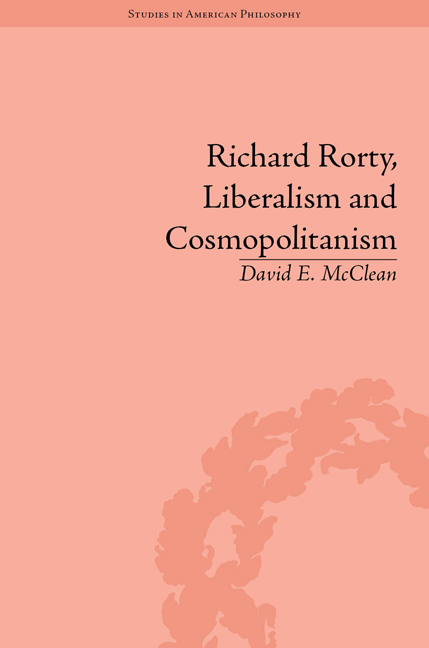Book contents
- Frontmatter
- CONTENTS
- Dedication
- Key to Works by Rorty
- Preface: Rorty's ‘Violence of Direction’
- 1 From Pragmatism to Rortyism
- 2 Alternative Utopias
- 3 Why Rorty Matters
- 4 Rorty on Religion, Race, Culture and Politics
- 5 Rorty and Cosmopolitanism
- Epilogue: Looking Forward to the Year 2096 with Cosmopolitan Hope
- Works Cited
- Notes
- Index
Preface: Rorty's ‘Violence of Direction’
- Frontmatter
- CONTENTS
- Dedication
- Key to Works by Rorty
- Preface: Rorty's ‘Violence of Direction’
- 1 From Pragmatism to Rortyism
- 2 Alternative Utopias
- 3 Why Rorty Matters
- 4 Rorty on Religion, Race, Culture and Politics
- 5 Rorty and Cosmopolitanism
- Epilogue: Looking Forward to the Year 2096 with Cosmopolitan Hope
- Works Cited
- Notes
- Index
Summary
Richard McKay Rorty (4 October 1931–8 June 2007) was one of the most interesting philosophers of modern times. This book explores, critically, the ways in which Rorty's insights might be used to achieve a political community in which, as Rorty himself had put it, ‘love is pretty much the only law’. This is not a book that will contribute very much to what is sometimes referred to as the ‘cottage industry’ of Rorty commentary and criticism – an internecine, mostly academic conversation (and sometimes, rhetorical brawl) about whether Rorty got certain other philosophers right (C. S. Peirce, John Dewey and Donald Davidson, for example), or whether his embrace of ‘continental’ philosophers such as Martin Heidegger, Hans-Georg Gadamer and Jacques Derrida was ‘illicit’ or even, as some have suggested, perverse. Although such commentary and criticism matter in the larger and ongoing discussions of Rorty's thought, this book will not take them up at any length, although some limited treatment of them is included in what follows (and, as will become evident, had to be). I will attempt, instead, to show how Rorty's thought can be used – and to what extent it can be used – as a tool to clear away the political, cultural and philosophical impediments that are, arguably, in the way of the achievement of the political community he saw as a possibility, although by no means as a certainty – a global cosmopolitan community that grows out of the best of the ideas that have given birth to Western liberalism.
- Type
- Chapter
- Information
- Richard Rorty, Liberalism and Cosmopolitanism , pp. 1 - 12Publisher: Pickering & ChattoFirst published in: 2014

